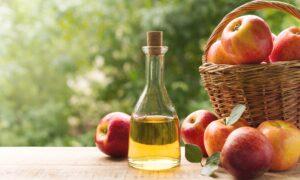Apple cider vinegar is widely used in beverages, salad dressings, and pickled foods, and it can even be used to clean the house. Apple cider vinegar is a precious winter health elixir that can aid digestion, help weight loss, activate blood circulation, control blood sugar, and combat bacterial and fungal infections. Herbal medicine educator Erica Kuo provides one effective way you can take apple cider vinegar to help you enjoy a healthy warm winter.
Spicy Apple Cider Vinegar
During the winter months, vinegar, honey, and warming spices and herbs can be used to create an immune-boosting tonic. In the west, this tonic is often called oxymel. Ms. Kuo shares her personal recipe for a spicy apple cider vinegar drink.- 1/2 cup Armoracia rusticana (horseradish)
- 1/4 cup ginger slices
- 1/4 cup garlic
- 1/2 cup onion
- 1/4 cup ginseng
- 2 to 3 chili peppers
- 4 to 5 cups apple cider vinegar
- 1/4 to 1/3 cup honey (to taste)
1. Chop all the ingredients and place in a half-gallon sterilized glass bottle and add apple cider vinegar to cover all spices by about 2 inches.
2. Cover with baking paper and cap the bottle.
3. Shake the bottle every day for 2 weeks so that all ingredients are fully submerged and mix well with the apple cider vinegar.
4. Place in the warmest cabinet in the kitchen and let sit for 1 month.
5. After 1 month, pour and filter the residue and pour the spicy apple cider vinegar into a clean container.
6. Add honey until desired sweetness and stir well.
7. Spicy apple cider vinegar can be stored in a cool kitchen cabinet until next spring.
1. For mild cold symptoms, mix 1 teaspoon of spicy apple cider vinegar with 1 cup of warm water and drink. Take 3 to 4 times per day.
2. Add to salads for seasoning.
3. Apply spicy apple cider vinegar on sore muscles and joints to relieve discomfort.
4. Apple cider vinegar with a little honey offers more flavor and sweetness.
Ingredients and Efficacy
Armoracia rusticana (horseradish) promotes gastric acid secretion and appetite. When a cold or fever sets in, it can help induce sweating and improve respiratory and urinary infections.In addition to the above ingredients, some herbalists may recommend adding rosemary, thyme, or turmeric.
Ms. Kuo advised that people with low blood pressure reduce consumption of garlic and onions. People with high blood pressure can add cinnamon to spicy apple cider vinegar for a bit more flavor and sweetness. Garlic can prevent blood coagulation, so people who are on anticoagulants shouldn’t add garlic. Cinnamon also has blood thinning effects. If it’s difficult to find horseradish, you can replace it with turmeric.
Ms. Kuo said the following three types of people shouldn’t take apple cider vinegar:
1. People with frequent gastroesophageal reflux should take care. Although herbs are added to spicy apple cider vinegar, people with weak gastrointestinal tracts shouldn’t consume it on an empty stomach and should drink it during or after meals only.
2. People with high blood pressure, with diabetes, or on diuretics should start with a small amount to gradually adapt to taking apple cider vinegar.






